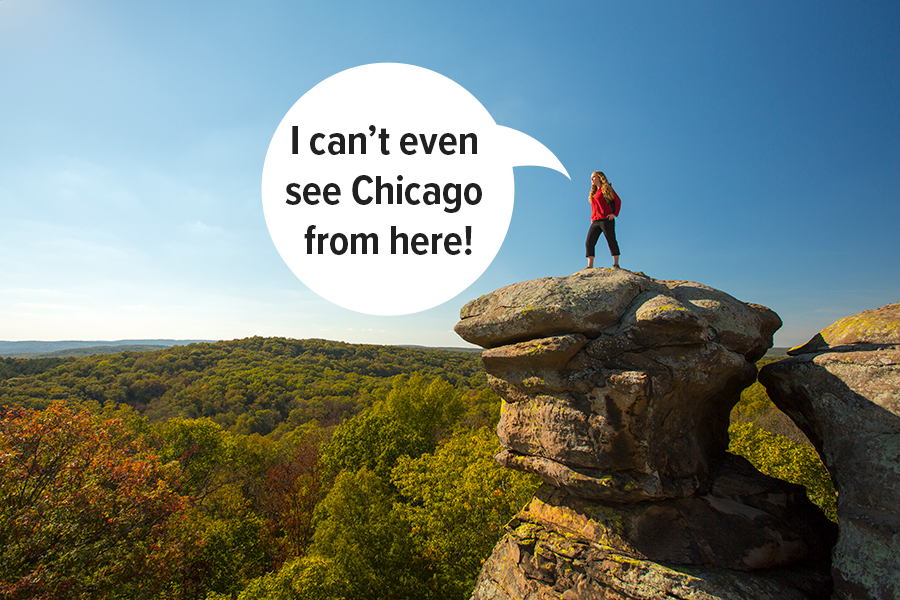It was a big, big legislative session for Gov. J.B. Pritzker and his Illinois Democrats. They passed a referendum for a graduated income tax. Their Reproductive Health Act made Illinois the most pro-choice state in the Midwest. They legalized weed.
In every case, those bills were passed with votes from Chicago-area legislators. Among representatives from south of I-80, they failed. As a result, in small towns such as Athens, Mount Vernon, and Effingham, downstaters are rallying to a movement called New Illinois, whose goal is to kick Chicago out of the state so rural counties can form a commonwealth whose politics are as red as those of Missouri, Kentucky, and Indiana.
“The economies and cultures and needs and interests of non-urban areas are different from those of a big city like Chicago,” New Illinois founder G.H. Merritt told the Tribune. “The problem is, in our state government we have a one-size-fits-all approach and things are foisted on the other parts of the state.”
Honestly, Chicago kicked itself out of Illinois a long time ago, and that, I believe, is a big part of the reason the rest of the state wants to make it official. Is there anywhere else in America a major city so indifferent to, or disconnected from, the state in which it lies?
“I’m not an Illinoisan,” a friend once told me. “I’m a Chicagoan. I kick ass and eat Italian beefs.”
We don’t call ourselves Illinoisans. We don’t root for the U of I, unless we went to school there — if we own an orange and blue shirt, it’s a Bears jersey. (That’s why Northwestern advertises itself as “Chicago’s Big Ten team.”) When we travel, we don’t tell people, “I’m from Illinois.” I’ve had some embarrassing conversations with people who think Bourbonnais is southern Illinois.
Frankly, there are cultural and geographical factors that make it difficult for us to feel anything in common with people who actually do call themselves Illinoisans. In his book American Nations: A History of the Eleven Rival Regional Cultures of North America, journalist Colin Woodard divides Illinois among three nations, making it one of only a few states containing as many disparate cultural regions under his schema. Chicago is in Yankeedom, a legacy of the fact that its first settlers were from New England; central Illinois is in the Midlands; southern Illinois is in Greater Appalachia, because it was settled by land-hungry farmers from the Upland South, and still shares that region’s attitudes on guns, religion, and small government. (Case in point: The singer of “Redneck Woman,” Gretchen Wilson, is from Pocahontas, Illinois.) On a national level, Yankeedom and Greater Appalachia are at odds politically, with the former voting for liberal Democrats and the latter for conservative Republicans, a pattern that repeats itself in Illinois.
And then there’s the fact that Chicagoans are Great Lakes people, while Illinoisans are prairie people. When a Chicagoan buys a cottage for a weekend getaway, it’s in Wisconsin’s Door County, or Michigan’s Harbor Country, not on Lake Shelbyville. In spite of the efforts of the folks at EnjoyIllinois.com, it’s hard to get Chicagoans to vacation downstate. There is some dramatic scenery in the Shawnee National Forest (especially the Garden of the Gods), but you have to drive through 300 miles of corn and soybeans to get there.
Downstaters are trying to break up the state, but it’s the responsibility of Chicagoans to keep it together, since we’re the dominant partner in the relationship. As is always the case, the aggrieved minority knows more about the arrogant majority than vice versa. As a commenter on Capitol Fax, the Illinois news website, once wrote, “Both downstate and Chicago are obsessed with the same thing: Chicago.”
Since Illinois is one of the most diverse states, there’s no reason there can’t be some diversity in its laws and policies. In Chicago, the legislative session was seen as a triumph of progressive values. Downstate, it was seen as the big city imposing its will on hapless, outnumbered country folks. Certain laws could apply only in counties with more than 500,000 residents. For example, Pritzker signed a bill raising the minimum wage to $15 an hour by 2025. That’s essential in Chicago, but it’s less essential in Mount Vernon, where a two-bedroom apartment rents for $635 a month.
The Chicago–downstate divide most recently came to a head when Gov. Pritzker banned the band Confederate Railroad from the DuQuoin State Fair, vowing that "the state of Illinois will not use state resources to promote symbols of racism." Disgrunted downstate fans decried the move as a case of political correctness gone too far, but also as symbolic of Chicago's tyranny over the rest of the state.
“In the southern part of this state, we suffer from a lot of decisions made from Chicago,” said Joe McKinney, who invited the band to play at his family’s banquet facility in DeSoto. “In addition to trying to bring the people what they want, we’re also trying to prove a point to northern Illinois: You don’t own everything.”
The bad blood over the ban might not have even been on Pritzker's radar, and it's easy to see why: Our last four governors have been from Cook County, and unsurprisingly, none have been embraced by downstate voters. (Even Republican Bruce Rauner lost southern Illinois in both his primary elections.)
Governor Pritzker’s position requires him to think of himself an Illinoisan before he thinks of himself as a Chicagoan. But it wouldn't hurt everyday Chicagoans to break out of their big city bubble once in a while to do the same. We may never call ourselves Illinoisans, but if we got outside city limits for a weekend, checked into the Soy City Motel in Decatur, and spent a Saturday night at Macon Speedway, we might have a better idea of what that means.



